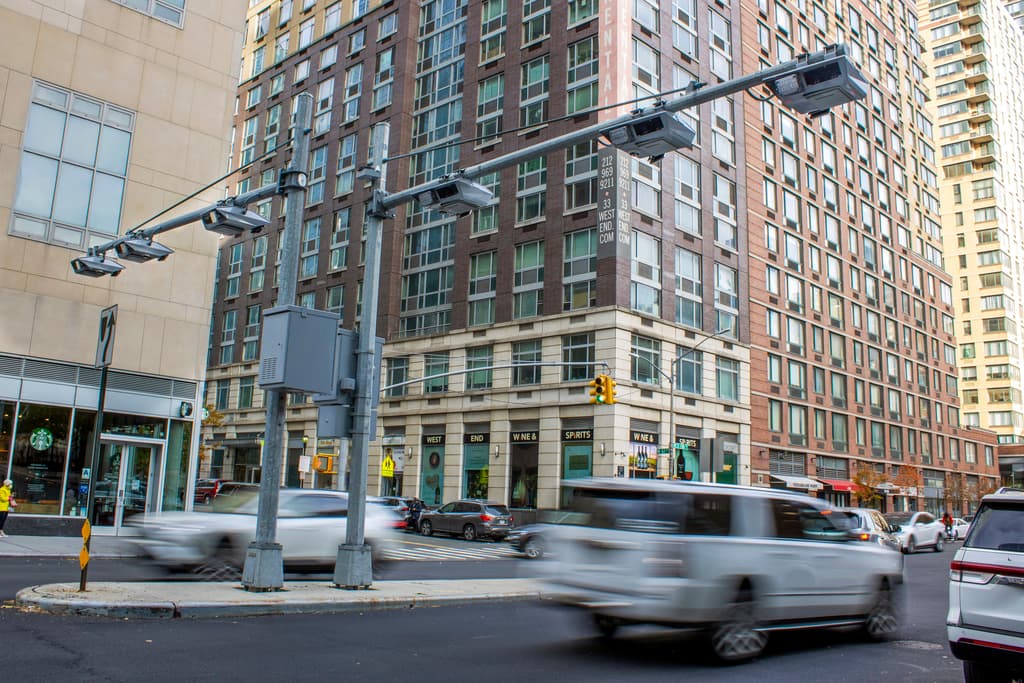More Suburbs Join Opposition to Congestion Pricing as Alarm Spreads Over a New Tax on America
City plans to push pollution onto suburbs in a scheme to raise money, supposedly to cover $2.5 billion deficits being run up by failing subways.

Suburbanites coast to coast are watching to see if New York City’s congestion pricing toll paves the way for increased burdens on them, too. As new voices rise up to oppose the first-in-the-nation plan, their argument echoes in bedroom communities everywhere residents must drive to survive.
New York plans to start charging motorists entering south of 60th Street — Manhattan’s central business district — by midyear. The cost will be $15 for passenger vehicles, $7.50 for motorcycles, and $24 to $36 for trucks. Toll infrastructure is already under construction.
New York’s Democratic governor, Kathy Hochul, said in November that congestion pricing “means cleaner air, better transit, and less gridlock on New York City’s streets.” Opponents note that the MTA is imposing the charge to cover a budget deficit projected to hit $2.5 billion next year.
Suburban communities say that the new tolls will punish them for MTA mismanagement while shifting Manhattan’s pollution to their backyards. Announcing that he’s asked a court to allow him to join his state’s lawsuit, the executive of Bergen County, New Jersey, James Tedesco, described the new tolls as “selfish money grab.”
The Rockland County Executive, Edward Day, tells the Sun that Rockland “will receive no direct benefit” from the tolls. He called the MTA “blatantly exclusionary of the West of Hudson suburban members … who already pay hundreds of millions of dollars each year to the MTA for the worst quality and least amount of transit service.”
Rockland has commuters living up to 45 miles from New York’s Central Business District. According to Mr. Day, his residents face “the highest level of transit inequity in the MTA region including a transit desert that forces more than 60 percent of our residents to drive into the city because they have no other way to get there.”
Although Bergen has more mass transit options than Rockland, Mr. Tedesco called it “shameful” that the MTA is “plugging revenue holes at the environmental and financial detriment” of his county. He expects the United States District Court for the District of New Jersey to rule if he can join the lawsuit by February 5.
Fort Lee, New Jersey, is suing, too. Home to the George Washington Bridge connecting to Manhattan at 168th Street, above the toll zone, they fear commuters flooding north. Already the busiest span in the world, the bridge serves a quarter-million motorists daily.
Fort Lee’s mayor, Mark Sokolich, told the press that he projects up to 25 percent more traffic on his streets from vehicles avoiding the tolls, bringing “additional pollution.” The Democratic congressman who represents the town and eastern Bergen, Joshua Gottheimer, agreed with that assessment and said the plan will cost commuters $5,000 a year.
Although Ms. Hochul says the new tolls are for the benefit of those living and working in the District, some of them are objecting, too. New Yorkers Against Congestion Pricing Tax, residents of Manhattan’s Lower East Side, filed a lawsuit earlier this month. Their concern, like New Jersey’s, is traffic displacement: Drivers flooding the toll-free FDR Drive.
The fight comes as New York City is struggling to recover from the pandemic. One plaintiff in the Lower East Side case, a funeral home owner, says the tolls will kill his business, noting the impossibility of transporting dead bodies on mass transit.
The New York City borough of Staten Island, which has no subway or commuter rail lines to Manhattan, took legal action last month in conjunction with the United Federation of Teachers. The union says its members will be among those bearing a disproportionate burden from the new tolls.
In November, the 25,000 members of the New York City Taxi Workers Alliance filed their own lawsuit, and trucking organizations signed a letter with government officials, transportation associations, chambers of commerce, and businesses citing similar objections.
The MTA will hold public hearings about congestion pricing on February 29, March 1, and March 4. Expect suburbanites to make their voices heard — speaking for residents of bedroom communities nationwide who, if New York City succeeds, will find the new toll plazas popping up in the cities where they work soon.

